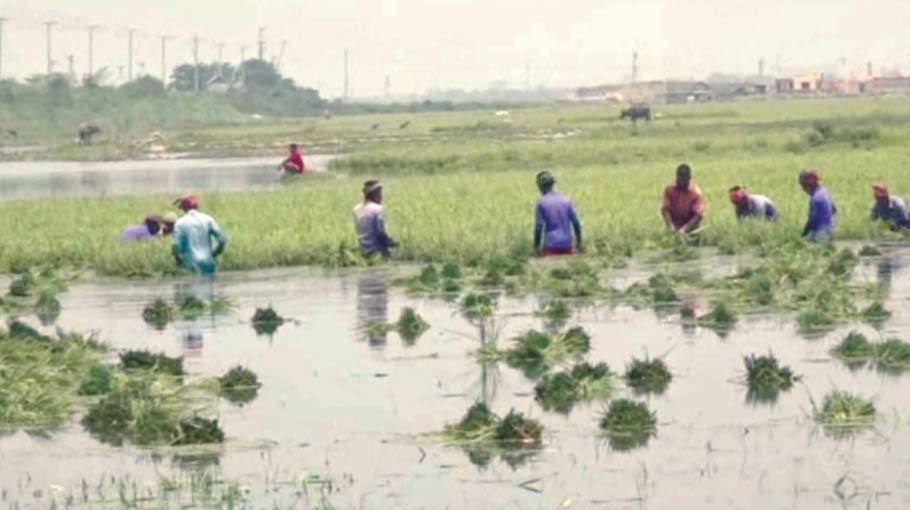Bizarre climate may effect crop loss

Since the very beginning of the year, the meteorologists have not considered the behaviour of the weather as normal. As a result, there is risk of continuous rains or drought in the country, which is likely to affect the agricultural sector.
Due to global warming, 23,000 crore working hours are lost in the world every year. Bangladesh is in the list of 10 most-hit countries.
According to the Bangladesh Meteorological Department, the average temperature in the country has risen by about 1.2 degrees Celsius in the last 100 years.
Meteorologist Bazlur Rashid said that the country's weather had been behaving abnormally since the beginning of this year, and work is underway to analyze various aspects of it.
“It is not going to rain now, but it is surprising that there is a hint of winter in some places sometimes,” he added.
According to the weather forecast, the rainfall may be less in some parts of the country and the temperature may drop in some areas much higher than normal.
But even if the rainfall is low, it will have an effect on the agriculture of the country, and even if it is in excess, it will have a negative effect. In other words, a situation like crop loss can also be created. Meanwhile, drought is again prevailing across the country and it is not raining as much as it should do at this time. Analysts say that if the drought situation continues for any reason, the country could be hit by a heatwave. According to the World Meteorological Organization, a place where the average daily temperature rises by 5 degrees and continues for five days in a row is called a heatwave.
As per the meteorological department of Bangladesh, if the temperature rises to 36 to 38 degrees, it is considered as mild heatwave, if it is 38-40 degrees, as moderate heat wave, 40-42 degrees, severe, and more than 42 degrees, an extreme heat wave.
As such, the heatwave in Bangladesh starts from 36 degrees Celsius. However, it all depends on the ability of the human body to adapt.
Heatwaves can have a devastating effect on every step of a crop, from agricultural production to pollination. The bizarre behavior of the weather for climate change has become increasingly visible over the last few years.
Scientists have long feared that Bangladesh could be one of the countries at risk due to climate change. As a result, the incidence of heavy rains and storms will continue to increase abnormally along with excess heat. As a result, life and livelihood will be threatened.
Read More: Tackling climate change
The well-known science journal Nature Communications published a research article last December on the effects of global warming on working people. The joint study, entitled "Increased Labor Losses and Decreased Adaptation Potential in a Warmer World," was conducted by a team of researchers from a number of well-known universities in the United States, including Stanford University, Duke University, and the University of Washington.
According to the article, global warming is increasing day by day due to climate change and also increasing humidity. Simultaneous warmth and humidity in the environment is harmful to the human body. In such hot weather the body sweats. Dry sweat reduces the chances of the body cooling down quickly. In very hot and humid weather, various complications occur in the bodies of farmers and workers working under the open sky. Their productivity decreases. They get sick again and again. Illness also creates the risk of death.
The article also gives an account of the loss of working hours due to very hot weather. It is reported that an average of 22,800 crore working hours are being lost in the world every year due to overheating. The annual loss in Bangladesh is 1,400 crore working hours. The per capita loss is 254 working hours. However, the report did not mention the financial value of the loss of labor hours in Bangladesh.
Researchers fear that the loss of working hours could increase in the coming days if immediate action is not taken to prevent climate change.
According to a survey of 50 cities conducted last year in the US-based science journal Proceedings of the National Academy of Sciences, the performance of Dhaka residents has declined the most in the world due to global warming. Due to the extreme temperature, about 5.75 crore people in Dhaka (including those coming from outside Dhaka for various jobs) are able to work less than their normal performance.
In most cities around the world, wetlands and vegetation are being protected and more trees are being planted to control the temperature. Nothing is happening in Bangladesh. On the contrary, unplanned urbanization of the metropolis is spreading to districts and upazila towns and villages.
According to researchers, changes in working hours can reduce the number of lost working hours worldwide by 30 percent. However, if the temperature rises further, its benefits may not match. If global warming increases by 1 degree, the adaptive capacity of workers is expected to decrease by about 2 percent. In that case, workers may have to work at extra temperatures even at the beginning of the day.
The country may experience two to three mild or moderate heat waves in April this year. During this month the day temperature will be slightly higher than normal. However, the night temperature may remain normal. This information has been given in the long-term weather forecast of April 2022 of the Meteorological Department. One to two depressions may also occur this month. One of these could turn into a cyclone. With that there is the fear of ‘Kalbaishakhi’ (nor’westers).




